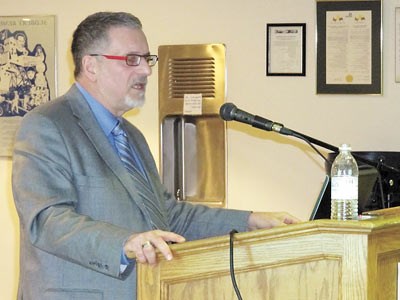Arts groups should promote activities on the basis of positive contributions and accomplishments to communities, said Alain Pineau, national director for the Canadian Conference for the Arts.
His non-profit organization educates Canadians and their leaders about the value of arts and culture for their communities and their nation.
He spoke at a Sudbury Arts Council event held at Tom Davies Square on Jan. 14. About 60 people from 10 arts organizations attended, according to Barbara Constantine, president of the Sudbury Arts Council.
Pineau went through a review of the history of federal government support for the arts and cultural sector, from the initiation of the Broadcasting Act and National Film Commission in the 1930s to the initiation of the Canada Council in the 1950s to reviews of copyright law in the past decade.
He counseled those present to make a stronger case for the arts or else risk seeing government support slide backwards.
“We have to change our approach and show that arts and culture enriches our lives rather than just asking for handouts from funders and the public,” Pineau said.
He pointed out that the arts and culture sector represents $86 billion to Canada’s economy and seven per cent of gross domestic product (GDP), the value of goods and services produced in Canada.
“One million persons are directly dependent on arts and culture for their livelihoods.”
By their activities in communities, like Sudbury, arts and cultural workers enhance the quality of life for everyone else, Pineau said.
Roger Nash, Laurentian University professor emeritus, and a participant in the audience, said even poetry has shown to be supported locally when properly presented. He said that he was involved in a 1997 fundraiser for the League of Canadian Poets at the St. Benedict school cafeteria on Algonquin Road in May called Rites of Spring.
“That night we raised $11,000 for the League. We had 400 people buy tickets.”
Nash said key to their success was bringing in top poets, such as James Reaney from Kitchener, along with local poets, and keeping ticket prices reasonable.
“Tickets were $5. We kept the time each poet had on stage to a minimum to keep the evening moving along. We had a lot of younger people in the crowd and they were actively cheering when some of the poets came on,” he said.
Nash added he and the organizers were able to get a lot of support from the business community in terms of cash and services for the event and a publication afterwards.
“The poets from outside the city were so impressed with the turnout, they said Sudbury was now the poetry capital of Canada. They had never seen so many out for a poetry event,” Nash said. An anthology of poems read during the evening was published. Over 1,000 copies were printed.
Nash said former regional city chairman, Tom Davies, bought 500 copies of the book and used it as part of a promotions package for the city.
“At that time the city was trying to shed its image as a bleak mining town with a moonscape image. They knew to attract doctors (for the hospitals) and engineers (for the mining companies) they had to make out the city as an attractive place to live and work.”
Pineau also alerted the arts organization members to how to lobby for federal support of arts and culture by understanding how the bureaucracy, politicians, and their staff operate.
But he noted that what he was disclosing about the federal government could also be used to effectively lobby municipal officials.
“When you go into a meeting with a politician make sure you present them with some options or ideas on your list that they can reject easily. However, for those ideas or options on your list that are your priorities, make sure they are identified as such.”
He also advised to build a relationship with elected officials.
“Know what their interests are. When they win their elections, make sure you congratulate them with a letter. And, ask them for a meeting to discuss your issues. Be prepared to wait awhile though in some cases.”
For more information, visit www.SudburyArtsCouncil.org or e-mail [email protected].
Join Sudbury.com+
- Messages
- Post a Listing
- Your Listings
- Your Profile
- Your Subscriptions
- Your Likes
- Your Business
- Support Local News
- Payment History
Sudbury.com+ members
Already a +member?
Not a +member?
Sign up for a Sudbury.com+ account for instant access to upcoming contests, local offers, auctions and so much more.
